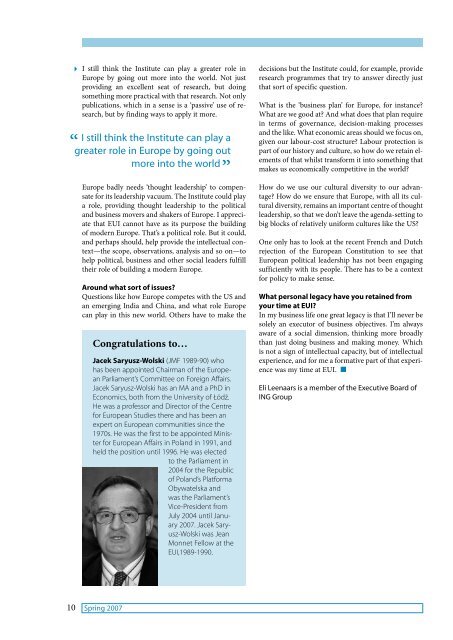Spring 2007 - European University Institute
Spring 2007 - European University Institute
Spring 2007 - European University Institute
Create successful ePaper yourself
Turn your PDF publications into a flip-book with our unique Google optimized e-Paper software.
}<br />
I still think the <strong>Institute</strong> can play a greater role in<br />
Europe by going out more into the world. Not just<br />
providing an excellent seat of research, but doing<br />
something more practical with that research. Not only<br />
publications, which in a sense is a ‘passive’ use of research,<br />
but by finding ways to apply it more.<br />
“ I still think the <strong>Institute</strong> can play a<br />
greater role in Europe by going out<br />
more into the world<br />
”<br />
Europe badly needs ‘thought leadership’ to compensate<br />
for its leadership vacuum. The <strong>Institute</strong> could play<br />
a role, providing thought leadership to the political<br />
and business movers and shakers of Europe. I appreciate<br />
that EUI cannot have as its purpose the building<br />
of modern Europe. That’s a political role. But it could,<br />
and perhaps should, help provide the intellectual context—the<br />
scope, observations, analysis and so on—to<br />
help political, business and other social leaders fulfill<br />
their role of building a modern Europe.<br />
Around what sort of issues?<br />
Questions like how Europe competes with the US and<br />
an emerging India and China, and what role Europe<br />
can play in this new world. Others have to make the<br />
Congratulations to…<br />
Jacek Saryusz-Wolski (JMF 1989-90) who<br />
has been appointed Chairman of the <strong>European</strong><br />
Parliament’s Committee on Foreign Affairs.<br />
Jacek Saryusz-Wolski has an MA and a PhD in<br />
Economics, both from the <strong>University</strong> of Łódź.<br />
He was a professor and Director of the Centre<br />
for <strong>European</strong> Studies there and has been an<br />
expert on <strong>European</strong> communities since the<br />
1970s. He was the first to be appointed Minister<br />
for <strong>European</strong> Affairs in Poland in 1991, and<br />
held the position until 1996. He was elected<br />
to the Parliament in<br />
2004 for the Republic<br />
of Poland’s Platforma<br />
Obywatelska and<br />
was the Parliament’s<br />
Vice-President from<br />
July 2004 until January<br />
<strong>2007</strong>. Jacek Saryusz-Wolski<br />
was Jean<br />
Monnet Fellow at the<br />
EUI,1989-1990.<br />
10 <strong>Spring</strong> <strong>2007</strong><br />
decisions but the <strong>Institute</strong> could, for example, provide<br />
research programmes that try to answer directly just<br />
that sort of specific question.<br />
What is the ‘business plan’ for Europe, for instance?<br />
What are we good at? And what does that plan require<br />
in terms of governance, decision-making processes<br />
and the like. What economic areas should we focus on,<br />
given our labour-cost structure? Labour protection is<br />
part of our history and culture, so how do we retain elements<br />
of that whilst transform it into something that<br />
makes us economically competitive in the world?<br />
How do we use our cultural diversity to our advantage?<br />
How do we ensure that Europe, with all its cultural<br />
diversity, remains an important centre of thought<br />
leadership, so that we don’t leave the agenda-setting to<br />
big blocks of relatively uniform cultures like the US?<br />
One only has to look at the recent French and Dutch<br />
rejection of the <strong>European</strong> Constitution to see that<br />
<strong>European</strong> political leadership has not been engaging<br />
sufficiently with its people. There has to be a context<br />
for policy to make sense.<br />
What personal legacy have you retained from<br />
your time at EUI?<br />
In my business life one great legacy is that I’ll never be<br />
solely an executor of business objectives. I’m always<br />
aware of a social dimension, thinking more broadly<br />
than just doing business and making money. Which<br />
is not a sign of intellectual capacity, but of intellectual<br />
experience, and for me a formative part of that experience<br />
was my time at EUI. n<br />
Eli Leenaars is a member of the Executive Board of<br />
ING Group

















